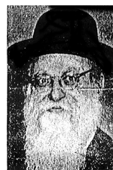 David Novoseller of Volyn (1877-1966) was the eighth in a long line of rabbis when he was selected to become Felshtin’s rabbi. “There were three other candidates, and each one made a speech to the assembly,” he explained to Philadelphia journalist Harold Feldman.
David Novoseller of Volyn (1877-1966) was the eighth in a long line of rabbis when he was selected to become Felshtin’s rabbi. “There were three other candidates, and each one made a speech to the assembly,” he explained to Philadelphia journalist Harold Feldman.
“Then it came my turn, and I said I would not give the speech I had prepared. Instead, I repeated phrase for phrase, word for word, the full speeches of the other three. And that won me the appointment.”
He described his principal duties as Felshtin’s rabbi: “My first duty was to answer questions about Torah, halachah, and fine points of the Mishneh. I arranged compromises between quarreling families and business people. I gave advice on personal troubles, settled disputes about wills and inheritances. And once a week, I went to the slaughterhouse to supervise kashruth.”
Rabbi Novoseller’s routine was forever changed by the horrific pogrom of February 1919. He was wounded 32 times and left for dead. Miraculously, he did not die and awoke in a pool of blood with two open head wounds and blood still flowing from his back. His wife and two daughters were killed, and he saw pigs feed on the intestines of his older daughter.
Rabbi! We buried your wife and two little girls. We found a large piece of flesh from a leg, but after examining your wife and daughters, saw that their legs were intact. We have no idea whose leg it is and where to bury it.
I replied: “That flesh is from my own leg. Bury it together with my wife and daughters …”
He concluded with a desperate plea:
“Ukraine became a river of blood and tears … Please send us money, tickets for the boat, and papers so that we can leave this G-dforsaken hell on earth.”
The Rabbi emigrated to Philadelphia in 1928, bringing some Felshtin orphans with him. For a man who had experienced so much horror, the goal of merely surviving would have been quite understandable.
Yet Rabbi Novoseller did far more than survive. In Philadelphia he founded Congregation B’nai Yehoshua, established a free hotel for homeless people, and started a business today known as Ko Kosher Service.
Several decades after arriving in America, Rabbi Novoseller reflected on his new home:
“In a way, this is another shtetl. A fine Jewish neighborhood this, where kosher butchers still make a living.”
He also told reporter Harold Feldman that he had little interest in “modernist” changes in Judaism: “If they say we put Talmud over Torah, then you can quote me as saying: yes, we depend more on the Talmud than on the Torah because Talmud tells us how to practice the Torah.”
By the time of his death in 1966 at 88, Rabbi Novoseller had touched many lives in two worlds.